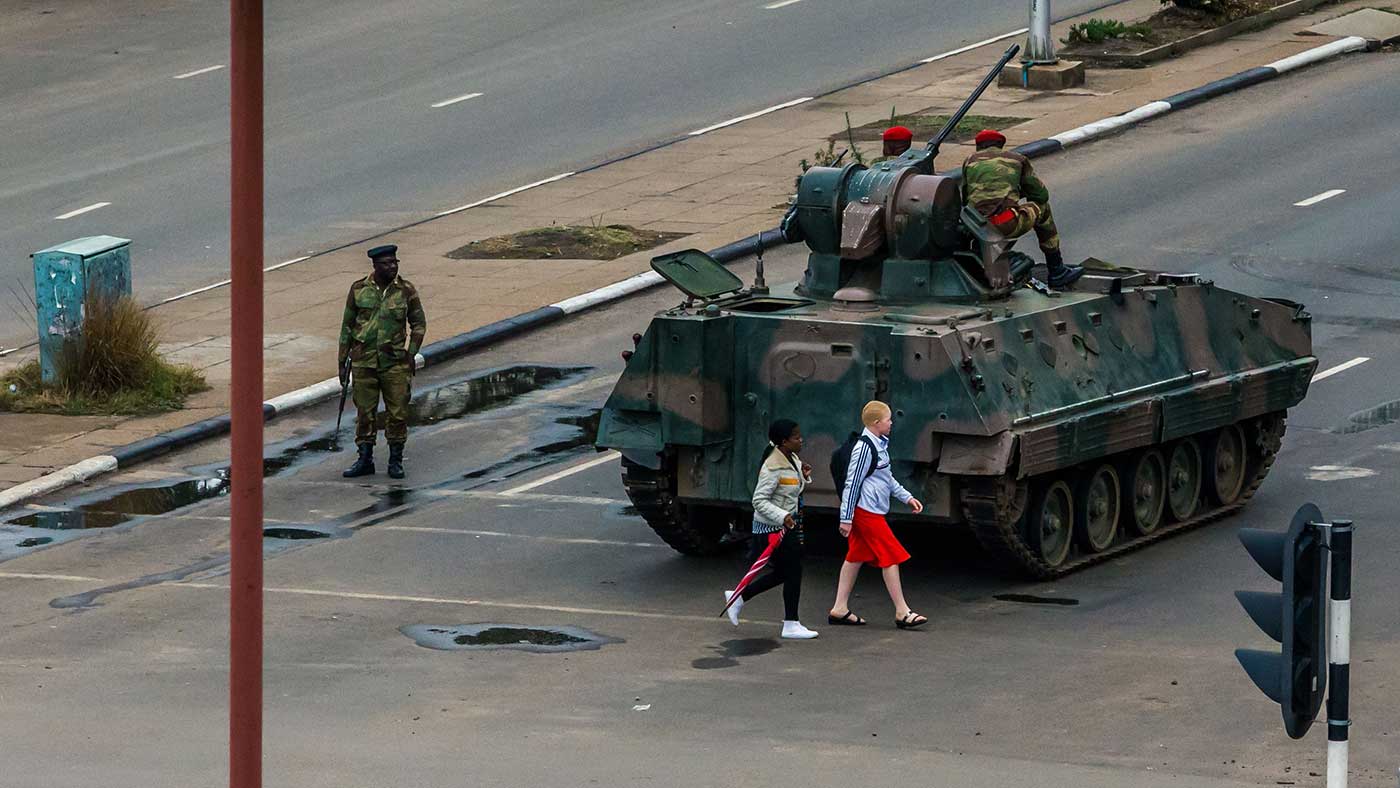Zimbabwe coup: Robert Mugabe ‘quits’ after military takeover
Confusion reigns as Zimbabwe’s political future remains unclear

A free daily email with the biggest news stories of the day – and the best features from TheWeek.com
You are now subscribed
Your newsletter sign-up was successful
Robert Mugabe has reportedly agreed to step down as President of Zimbabwe, following a military takeover in the capital Harare.
Troops seized control of state television station, ZBC, arrested several ministers and said they were acting against “criminals” surrounding the 93-year-old head of state.
Mugabe has since “negotiated with the country’s military for his wife Grace to leave the country and obtain ‘safe haven’, possibly in neighbouring South Africa, in return for him giving up power”, the African News Agency reports, citing a security source.
The Week
Escape your echo chamber. Get the facts behind the news, plus analysis from multiple perspectives.

Sign up for The Week's Free Newsletters
From our morning news briefing to a weekly Good News Newsletter, get the best of The Week delivered directly to your inbox.
From our morning news briefing to a weekly Good News Newsletter, get the best of The Week delivered directly to your inbox.
The source confirmed that soldiers “have the President and his presidential guard under siege” and said Mugabe would announce the handover of power at a press conference later today.
“The main goal of the generals appeared to be preventing Mugabe’s wife Grace,41 years his junior, from succeeding him,” Reuters reports.
However, some reports suggest that she has already fled to neighbouring Namibia. Namibian officials have not confirmed that she is there.
Zimbabwe remains “on a knife edge”, says Reuters, with military vehicles and personnel continuing to occupy strategic positions throughout the capital. But shops and businesses are open and many Zimbabweans are going about their business.
A free daily email with the biggest news stories of the day – and the best features from TheWeek.com
“No matter what happens, this appears to be a watershed moment for Zimbabwe and southern Africa, which have suffered from the tumult of Mugabe’s reign, even as his hold on power sometimes seemed unshakable,” says the Washington Post.
-
 The environmental cost of GLP-1s
The environmental cost of GLP-1sThe explainer Producing the drugs is a dirty process
-
 Greenland’s capital becomes ground zero for the country’s diplomatic straits
Greenland’s capital becomes ground zero for the country’s diplomatic straitsIN THE SPOTLIGHT A flurry of new consular activity in Nuuk shows how important Greenland has become to Europeans’ anxiety about American imperialism
-
 ‘This is something that happens all too often’
‘This is something that happens all too often’Instant Opinion Opinion, comment and editorials of the day
-
 Epstein files topple law CEO, roil UK government
Epstein files topple law CEO, roil UK governmentSpeed Read Peter Mandelson, Britain’s former ambassador to the US, is caught up in the scandal
-
 Iran and US prepare to meet after skirmishes
Iran and US prepare to meet after skirmishesSpeed Read The incident comes amid heightened tensions in the Middle East
-
 Israel retrieves final hostage’s body from Gaza
Israel retrieves final hostage’s body from GazaSpeed Read The 24-year-old police officer was killed during the initial Hamas attack
-
 China’s Xi targets top general in growing purge
China’s Xi targets top general in growing purgeSpeed Read Zhang Youxia is being investigated over ‘grave violations’ of the law
-
 Panama and Canada are negotiating over a crucial copper mine
Panama and Canada are negotiating over a crucial copper mineIn the Spotlight Panama is set to make a final decision on the mine this summer
-
 Why Greenland’s natural resources are nearly impossible to mine
Why Greenland’s natural resources are nearly impossible to mineThe Explainer The country’s natural landscape makes the task extremely difficult
-
 Iran cuts internet as protests escalate
Iran cuts internet as protests escalateSpeed Reada Government buildings across the country have been set on fire
-
 US nabs ‘shadow’ tanker claimed by Russia
US nabs ‘shadow’ tanker claimed by RussiaSpeed Read The ship was one of two vessels seized by the US military